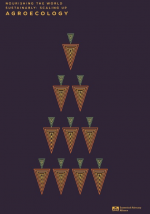News
16.10.2012
Via Campesina Highlights Risks of ‘Bad’ Agricultural Investments

At a press conference held yesterday in Rome, one day ahead of World Food Day, international peasants’ movement Via Campesina warned of the major risks that the wrong type of agricultural investment pose to land and water resources and, as a consequence, the livelihoods of small-scale farmers. According to Via Campesina, intelligent agricultural investment can serve to support peasant agriculture but, when investments do not recognise the interests of small scale farming families, violations of rights by private sector investments are common. Ibrahima Coulibaly, West African member of the International Coordinating Committee of Via Campesina, said “the multinationals investing in Africa do anything but benefit the most vulnerable.” This position was supported by Canadian small-scale farmer Kalissa Regier, who said “rather than using large-scale private investments or public-private partnerships, the States should mobilise public funding to support small-scale family farmers and peasants who grow most of the world’s food, and who play a central role in combating hunger.” The Via Campesina press conference took place during the 39th session of the World Committee for Food Security (CFS), an intergovernmental body open to civil society, the private sector, international organisations and research institutions. At the opening session yesterday, FAO Director-General José Graziano da Silva called on the CFS community “to work together to develop principles for responsible agricultural investment that respect rights, livelihoods and resources.” The CFS has initiated a two-year process to elaborate principles for responsible agricultural investment.
12.10.2012
Christian Alliance Calls for Investment in Agroecology to End Hunger

On Tuesday, the Ecumenical Advocacy Alliance (EAA), a broad international network of churches and Christian organisations, published a paper which calls for increased investment in sustainable agricultural practices in order to support small-scale farmers and protect the environment. The paper, entitled “Nourishing the World: Scaling up Agroecology” comprises numerous success stories which demonstrate how agroecological methods have increased yields for farmers by using locally-available natural resources. At the same time, these methods have reduced farmers’ dependency on expensive and polluting chemical fertilisers and pesticides. The release of the paper coincided with the publication of the FAO’s new figures on global hunger which show that 870 million people are still suffering from hunger. EAA underlines that hunger is not caused by a lack of food: Worldwide, enough food is produced to feed 10 billion people. “Tackling hunger is not in the first instance about producing more food. It is about investing responsibly in sustainable agricultural practices and changing wasteful consumer habits”, said EAA’s Food Campaign Coordinator, Christine Campeau. The paper provides alternatives to the current industrial model of agriculture. “In the context of climate change, business as usual in the field of food production is not an option. Agroecology offers the prospect of sustainable food production to meet the needs of a still growing global population, while at the same time reducing the global greenhouse gas emissions from the agricultural sector, building resilience to already unavoidable climate change, protecting biodiversity and sustaining communities and rural livelihoods”, the paper concludes.
09.10.2012
New FAO Report: 870 Million Suffering from Hunger

According to a new UN report published today, almost 870 million people are chronically undernourished worldwide. This means that in the period 2010-2012 one in every eight was suffering from hunger. The majority of the hungry live in developing countries. “In today’s world of unprecedented technical and economic opportunities, we find it entirely unacceptable that more than 100 million children under five are underweight, and therefore unable to realize their full human and socio-economic potential,” said the heads of the Food and Agriculture Organization (FAO), the International Fund for Agricultural Development and the World Food Programme in the foreword to the report. Compared to the figures collected for the period 1990-92, the number of undernourished people has declined by 132 million. This is more than previously expected. The report is optimistic that the UN Millennium Development Goal (MDG) target of halving the share of the world’s hungry could be within reach if this rate of decline continues until 2015, and adequate measures are taken. In reality however, progress in reducing hunger has slowed since 2007-08, and now levelled off. Looking at different regions, the situation has improved in Asia and the Pacific, where undernourishment has decreased to 13.9%. Latin America and the Caribbean have also seen an improvement, with ‘only’ 8.3% of the population suffering from hunger. In Africa, the number of hungry people has risen from 175 to 239 million - with more than one in four going hungry. In sub-Saharan Africa, hunger has been rising by 2% per year since 2007. According to the authors, the report ‘State of Food Insecurity in the World 2012’ used updated information on population, food supply and distribution, as well as food losses. The methodology does not however fully capture the effects of the food price crisis of 2007-2008 or the short-term effects of recent food price surges.
05.10.2012
Oxfam Calls on World Bank to Freeze Land Investments

Development agency Oxfam International has urged the World Bank to stop investing in large-scale land acquisitions to prevent land grabbing in developing countries. According to a new Oxfam report published on Thursday, the area of land which has been sold off worldwide in the last decade is eight times the size of the United Kingdom. This land could have produced sufficient food for a billion people – the current number of people suffering from hunger. The report “Our Land, Our Lives” shows that between 2000 and 2010 more than 60% of investments in agricultural land made by foreign investors occurred in developing countries with serious hunger problems. The crops produced on this land were either exported or used for biofuel production. “The world is facing an unbridled land rush that is exposing poor people to hunger, violence and the threat of a lifetime in poverty”, commented Jeremy Hobbs, Executive Director of Oxfam International. The organisation has demanded a temporary freeze of the World Bank’s agricultural investments in land so as to send a clear signal to investors. The moratorium would give the World Bank time to improve standards for transparency in land deals, to ensure the prior consultation of affected communities and to strengthen people’s land rights. Senior bank officials however consider it a mistake to stop the World Bank's involvement at a time of rising food prices and growing interest by foreign investors in farmland.
01.10.2012
Fighting Food Insecurity with Fish: Global Initiative Launched

The Food and Agriculture Organisation (FAO) today announced an international initiative to enhance understanding of the role that fish farming plays for food security in developing countries. The alliance AFSPAN (Aquaculture for Food Security, Poverty Alleviation and Nutrition) will bring together development agencies, governments and universities. The EU has provided one million Euros for the three-year project, which is intended to help countries in Africa, Asia and Latin America to develop sustainable policies to improve the livelihoods of millions of people. “The project will work closely with fish farming communities and will focus on field research in many major aquaculture countries in the developing world”, said FAO’s senior expert on aquaculture, Rohana Subasinghe. Fish is the main source of protein for 17 percent of the world's population – nearly 25 percent in low-income, food-insecure countries. However, overfishing and climate change are now posing a threat to fish stocks. A new study by the University of British Columbia found that global warming is likely to shrink the size of fish by as much as a quarter by 2050 due to the difficulties presented by warmer, oxygen-poor waters. The scientists have also warned of a reduction of overall fish stocks.
27.09.2012
Report Confirms Biofuels Causing Misery for Millions

A new report, released by Oxfam, reveals that land used to power European cars with biofuels for just one year could produce enough wheat and maize to feed at least 127 million people. In addition, the EU biofuel target also effects European consumers through higher fuel prices at the pumps. Oxfam's ‘The Hunger Grains’ report confirms that biofuels are definitely not the solution to climate change they promised to be. It has been calculated that meeting EU biofuel targets could be as bad for the environment as putting 26 million extra cars on Europe's roads as biofuels displace other crops onto forests, peatlands and grasslands - all of which keep greenhouse gases out of the atmosphere. Biofuel targets introduced in 2009 to help fight climate change have become progressively more controversial. In Europe, the targets will be met almost exclusively from food crops at a time of record prices. Barbara Stocking, Oxfam's Chief Executive, said: "The EU must recognise the devastating impact its biofuel policies are having on the poorest people through surging food prices, worsening hunger and contributing to climate change". Key industry figures, including the CEOs of Unilever and Nestlé and billionaire hedge-fund manager Jeremy Grantham, have added their voices to NGO concern that diverting food crops to fuel for American and European cars might start a food crisis, following on from the worst US drought in half a century. Last week, French president François Hollande also called for a “pause” in the development of biofuels competing with food.
- The Himalayan Times: European biofuel targets contribute to global hunger: Oxfam
- The Huffington Post: Biofuels Are Causing Misery for Millions and Costing UK Consumers
- Oxfam: Using crops for fuel not food is driving up prices and risking hunger for millions, warns Oxfam
- Oxfam Report Download: The Hunger Grains: The fight is on. Time to scrap EU biofuel mandates
24.09.2012
Controversial Agent Orange Chemical to be Used on GM Crops

In an attempt to deal with the crippling weed resistance associated with ‘Roundup ready’ GM crops, a US based company is attempting to introduce a new, controversial, GM corn plant. The controversy surrounds the fact that the new GM product relies on a highly toxic chemical that was once a component of the Vietnam war defoliant, Agent Orange. Instead of the new crop being resistant to one chemical, Dow’s new seed is engineered to resist two. New solutions are seen as vital because “superweeds" are now so prevalent in the US, up to 15 million acres of American crops are affected. After planting GM crops over a number of years, thousands of farmers across the US are facing major problems with weeds that are so powerful that spraying them with 24 times the recommended dose of Roundup fails to kill them. One resistant weed every 10 square metres can reduce yields from productive plants by 50%. Dow says this is a more effective solution because it allows farmers to mix and match their sprays more effectively. However, controversy surrounds the fact that the new trait makes crops resistant to a chemical called 2,4-D. This powerful weed killer is currently used sparingly in agriculture because it is highly toxic and scientists are concerned that if farmers are not educated to use the new GM product properly, resistance issues will soon re-appear.
21.09.2012
Sustainable Food Trust Launches Global Food and Farming Campaign

The Sustainable Food Trust’s (SFT) global food and farming campaign was launched in the UK yesterday. The organisation plans to build a global network of collaborative partnerships with individuals, organisation and those playing key roles within the wider food movement, to support collaboration and disseminate research and policy throughout the world. The Trust plans to work at all levels, locally and internationally, to build a body of better-informed public opinion about the impact of different food and farming systems on the environment, human health and society as a whole. The SFT will focus on disseminating the message that the capacity of food and farming systems to undergo a rapid transformation away from the present industrial model, towards a more resilient and sustainable alternative, will only be possible if it is reinforced by citizens who are well informed.
18.09.2012
Call for African Farming Strategies to Focus on Women

A briefing paper, entitled 'Women in African agriculture: farmers, mothers, innovators and educators’, was released on 17th September by London’s Imperial College, Montpellier Panel. The paper calls for urgent action to address the needs and perspectives of women in smallholder agricultural policy in sub-Saharan Africa. The Panel highlighted the fact that although women play crucial roles throughout the value chain as farmers and business women, large numbers of the poorest, most disadvantaged and marginalised people in sub-Saharan Africa are women and some of the poorest households are headed by women. The paper also illustrates how national agricultural policies often assume farmers are mostly men, even though, according to the FAO, women in some African countries spend up to 60% of their time on agricultural activities. Women farmers also contribute up to 50% of labour on farms in sub-Saharan Africa and more than 60% of employed women in sub-Saharan Africa work in agriculture. The paper therefore suggests that developing policies that focus on the needs of African women is an economic imperative as there is a major global gender gap in agriculture, which translates into a costly lost opportunity to improve the quality and quantity of the world's food supply. The paper argues that if women had the same access to, and control over productive resources as men, they could increase yields on their farms by 20 to 30%. This could raise total agricultural output in developing countries by 2.5 to 4%, which could in turn reduce the number of hungry people in the world by 12 to 17% (100-150 million). As the Montpellier Panel underlines, reaching and including women in agricultural policy in Africa will require a substantially different approach by African national governments and the European governments that wish to work with them.
14.09.2012
Californians Gearing Up For ‘Right to Know’ Food Battle

'Just Label It', a US coalition calling for mandatory labelling of genetically engineered (GE) foods, today announced its endorsement for the 'Yes on Prop 37- California Right to Know' campaign. The ‘Proposition 37’ vote, to be held this November is a local referendum offering Californian citizens the chance to vote for the mandatory labelling of GE foods. Although the European Union has required GE labelling since 1997, the United States has not, and as a consequence most processed foods like cereals, snacks and salad dressings have contained ingredients from plants whose DNA was manipulated in a laboratory. In the EU companies generally formulate their products so that they do not contain any GE ingredients and so do not need labelling, and David Byrne, the former European commissioner, has confirmed that requiring GM labelling did not impact the cost of products. As Americans become more aware of the role that food plays in their health, they also want more information about what they eat, including whether it contains GE ingredients. Ronnie Cummins, national director of the Organic Consumers Association, said he expected Prop 37 to pass. In a poll of 800 likely California voters in July by the California Business Roundtable and Pepperdine University, 64.9% said they were inclined to vote in favour of Proposition 37 based on their knowledge at that time. So far, opponents of Proposition 37 have committed roughly $25 million to defeat it, with the largest contributions coming from Monsanto and DuPont which have made big investments in GE crops. Supporters of Proposition 37 have gathered $3.5 million from donors.

